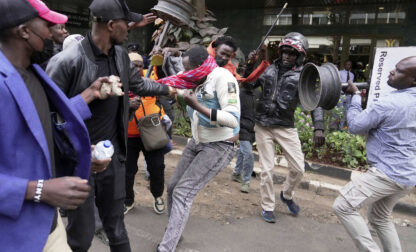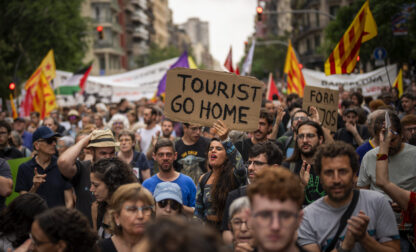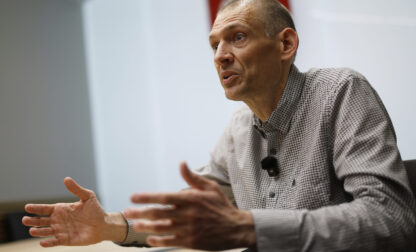Milan-based AP reporter Colleen Barry initially requested an interview with Placido Domingo last August ahead of his first European performance following Jocelyn Gecker’s exclusive reporting detailing sexual misconduct and abuse of power allegations against the opera legend. She did the same the next time Domingo appeared in Europe later that year. Each time, his PR team gave a firm “No, he would not speak to the AP.”
Over those months, Barry worked closely with Gecker and wrote several stories about the European reaction to Domingo and the AP story. She spoke to his die-hard fans, casual observers, critics and experts focused on women’s rights issues in Europe and described the geographical divide between the reaction in the U.S. and in Europe.
Then the pandemic erupted and Barry focused on covering the deadly and devastating outbreak in northern Italy, where she is based. Domingo himself contracted the virus and recovered.
Opera star Plácido Domingo denied ever abusing power during his management tenure at two U.S. opera houses in an interview with The Associated Press, but deflected direct questions about sexual harassment. https://t.co/iNtl8wmUxW
— The Associated Press (@AP) August 23, 2020
Earlier this summer,Barry noticed that Domingo was set to come to Caserta and the Arena di Verono in Italy – among his first public appearances since the pandemic – and she again reached out to Domingo’s team to request an on-camera interview. Initially,his PR team said no. But six days later,a new PR team agreed.
Worried that the new PR team was not fully aware of Gecker’s investigative reporting on Domingo, Barry triple checked that they understood – all questions would be allowed. She did not want Domingo to cancel the interview at the last minute or refuse to answer questions about the misconduct allegations and investigations.
Barry then spent the next several weeks negotiating better access for the interview. She convinced the PR team to allow photos and video to cover not just the interview,but also his performance on the eve of the interview so that the visual package could include him on stage and the crowd reaction.
When the PR team said Domingo would speak only Italian because his English was too rusty,Barry pushed back again,remembering that when she covered Domingo in Salzberg,he spoke English well. When the interview finally took place,Barry was able to switch back and forth between English and Italian.
Barry’s past experience covering Domingo and her close collaboration with Gecker also ensured she was prepared for potentially tense moments during and after the interview. The PR team told Barry that his family would not be attending the interview,but Barry was doubtful. She knew his sons were always by their father’s side and thought there was a good chance they would be there,along with Domingo’s wife. Indeed Domingo showed up with his wife, sons and four PR reps.

As AP producer Patricia Thomas,who was also present,noted: “This put enormous pressure on Colleen – it is hard interviewing an opera legend about his misconduct with women with his wife (dressed in white with white gloves and mask) and two sons seated behind her. They were ready to pounce and pounce they did – actually “swarming” Colleen at one point when her insistent questioning sent them all flying out of their seats to stop the interview from proceeding. Colleen did not lose her cool,she calmly insisted on her points and we carried on with the interview.”
Barry’s story got wide play with news outlets directly crediting the AP’s interview and previous reporting. Some non-AP customers,including the BBC, were forced to credit the AP in their story about the interview and Domingo’s denial of abusing power.




